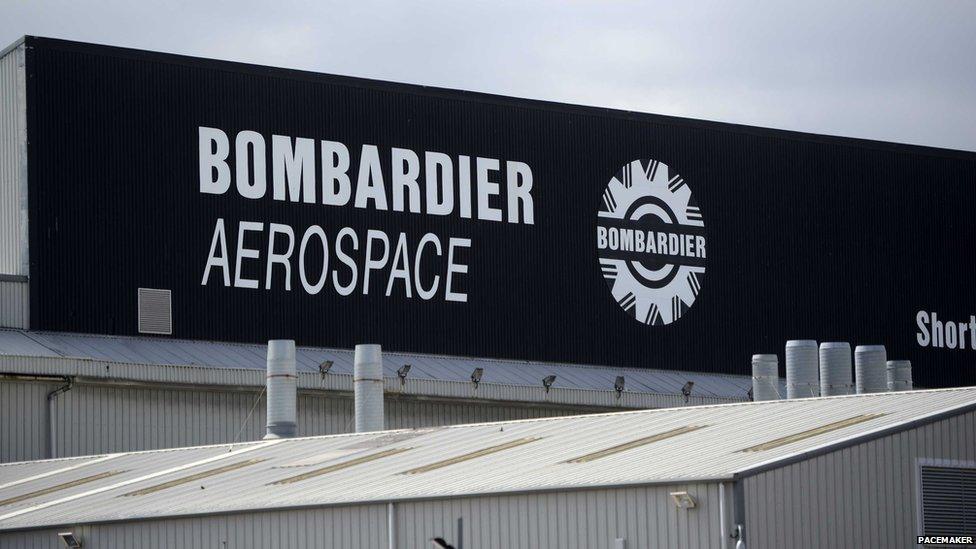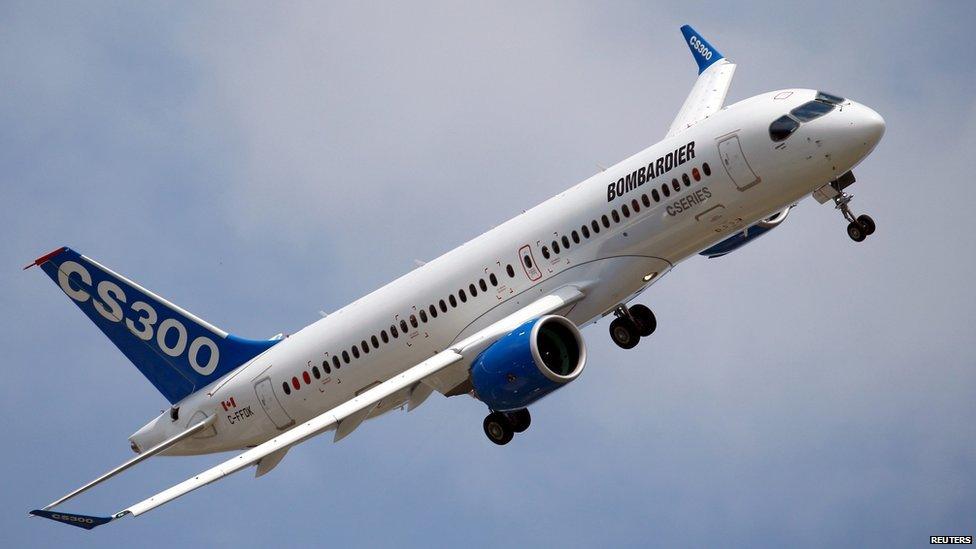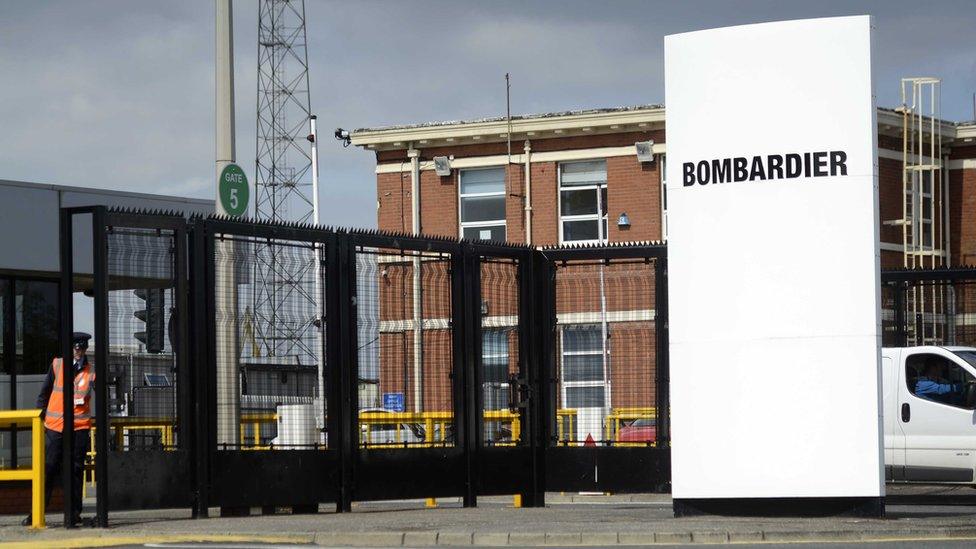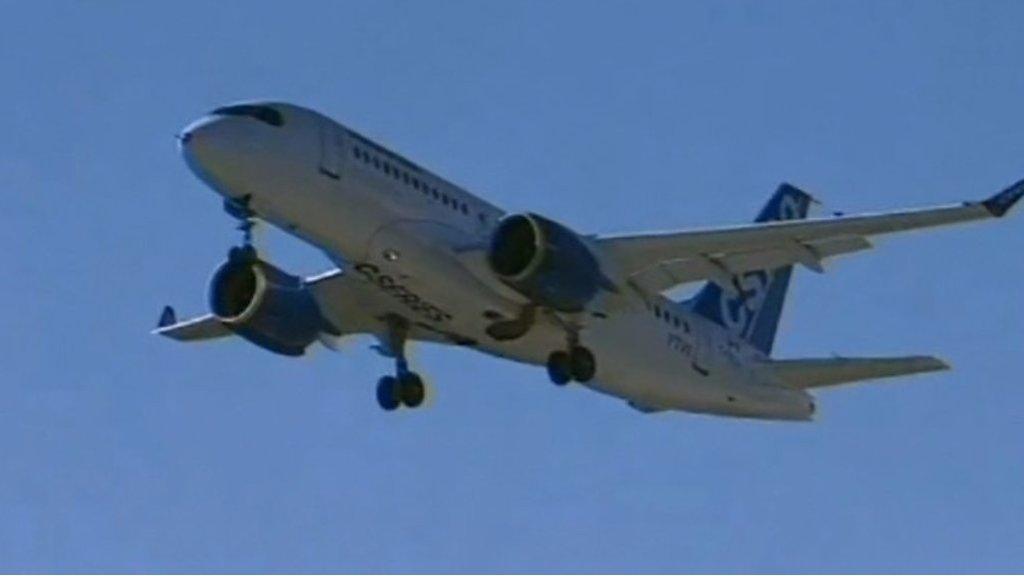Bombardier and Boeing urged to end trade dispute
- Published

Financial penalties could be imposed, which could jeopardise a major order from US airline Delta
Two rival aerospace firms have been urged by the government to negotiate a deal in a trade dispute that threatens manufacturing jobs in Belfast.
Canadian firm Bombardier is to find out if it will suffer financial penalties over a trade dispute with Boeing.
Boeing alleges Bombardier got unfair state subsidies from the UK and Canada.
Northern Ireland Secretary James Brokenshire said the government's support of Bombardier did not constitute unfair support.
He was speaking after meeting members of the trade union, Unite, in Belfast ahead of a decision on the complaint from the US Commerce Department.
The American firm's complaint, lodged in April, claimed Bombardier was selling its C-Series jet below cost in the United States.
Financial penalties could be imposed, which would deal a blow to Bombardier.
They could potentially jeopardise a major order made last year from US airline Delta - a $5.6bn (£4.15bn) deal for up to 125 of the jets.
About 1,000 jobs at the company's Belfast operation are linked to the C-Series.
The company - which bought Short Brothers in 1989 - is one of Northern Ireland's most important employers.

Case against Bombardier?
The US trade investigation to which Bombardier is being subjected is a complex, multi-stage process.
It involves the interplay of two government agencies, the Department of Commerce and the US International Trade Commission (USITC).
The USITC effectively ruled there was an arguable case against Bombardier, moving the complaint to the next stage.
Now, it is up to the Department of Commerce to make a preliminary finding on whether Bombardier has in fact received subsides, or is selling below cost.

Prime Minister Theresa May raised concerns about the possible implications of the ruling in a telephone call with President Donald Trump earlier this month.
The government and trade unions fear it might even make Bombardier question remaining in Northern Ireland, where it employs 4,100 people in four locations.
The history of Bombardier in Northern Ireland
The wings of the C-Series are made at a purpose-built £520m factory at Queen's Island.
The programme is not just important to Bombardier jobs in Belfast, but also 15 smaller aerospace firms in NI - and dozens more across the UK - which make components for the wings.
The Northern Ireland Executive and UK Government pledged to invest almost £135 million in the establishment of the C-Series manufacturing site.
The programme received £750m from Quebec's provincial government in 2015 when its fortunes appeared to be ailing.
Delays and cost over-runs in bringing the passenger plane to market almost bankrupted Bombardier, which has had to axe jobs worldwide as part of a survival plan.

Parts of Bombardier's C-Series planes are made in Belfast
The Department of Commerce could announce a preliminary tariff on the C-Series, raising the cost of importing the plane to the United States.
That should not have a huge immediate practical impact as it will be the spring of 2018 before Bombardier delivers any C-Series to Delta, its US customer.
If the finding does go against Bombardier, the investigation moves to the next stage, with attention switching back to the USITC for its final ruling.
The role of the USITC at this stage is to assess if damage has been caused to a US company, in this case Boeing, as a result of the subsides or below cost selling.
This verdict, due to be delivered in February 2018, will be the key one.
But even that may not be the end of the process.
USITC determinations can be appealed to the US Court of International Trade or, as this is a case involving Canada, to a disputes panel of the North American Free Trade Agreement (Nafta).
Ultimately the government of Canada could pursue a case against the US at the World Trade Organisation.
- Published26 September 2017

- Published12 September 2017

- Published12 September 2017

- Published17 February 2016
